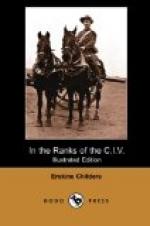A recurring duty for drivers was that of “stableman.” There were two of these for each sub-division, who were on duty for the whole day in the lines. Their function, in addition to the usual duties, was to draw forage, watch the horses, and prepare all the feeds in the nose-bags, ready for the drivers. The post was no sinecure, for in addition to the three standard oat feeds, there was oat straw to be put down after dinner, and, at eight o’clock at night, a final supper of chaff, except for invalids, who got special feeds. A list of these was given you generally at the last moment, and it was a test for your temper to go round the lines on a windy night, lighting many futile matches, in order to see the number on the off fore hoof, so as to hit off the right ones. There was generally a nose-bag missing at this stage, which was ultimately found on a C horse (my sub-division was D), and then there was a lively five minutes of polite recrimination. At 8.30 the nose-bags had to be taken off, and muzzles put on—canvas affairs with a leather bottom, strapped on by the head collar—as a preventive against disease from the chill morning air. Every man, after evening stables, was supposed to leave his muzzles on the jowl-piece of his horses, but a stableman was quite sure to find two missing, and then he would have to scour the tents, and drive the offender to the lines to repair his neglect; then he could go to bed. Another extra duty was that of picket at night, which came round to gunners and drivers alike, about every ten days. “Two hours on and four hours off” was the rule, as on all sentry-duty. I rarely found the night watches long. There was plenty to do in watching the horses, which are marvellously ingenious at untying knots, and in patrolling the camp on the look-out for imaginary rebels. By the way, the only live rebel I ever saw was the owner of a farm, near which we halted during one sultry dusty route-march. He refused to allow us to water our horses and ourselves at his pond, defying us with Lord Kitchener’s proclamation enjoining “kind treatment” of the Dutch!
As the days passed without orders for the front, impatience and disappointment grew. We were fit and well, and were not long in reaching the standard of efficiency which carried us successfully through our campaigning later. We used to “grouse” vigorously over our bad luck, with what justice I do not pretend to say; but no one who has not experienced it, can understand the bitterness of inaction, while the stream of reinforcements is pouring to the front. Scraps of news used to come in of the victorious march of the army northward, and of the gallant behaviour of the C.I.V. Infantry. Companies of Yeomanry used to arrive, and leave for destinations with enticing names that smelt of war, and night after night rollicking snatches of “Soldiers of the Queen” would float across the valley from the troop-trains, as they climbed the pass northward.




